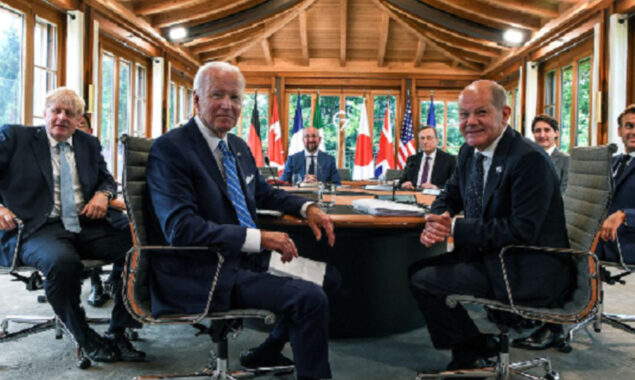
G7 leaders
- The leaders of the Group of Seven vowed to generate $600 billion in public and private funding
- The leaders of Italy, Canada, and Japan also spoke.
- Pool/Kenny HolstonChina’s investment plan includes projects and initiatives in more than 100 nations with the goal of modernising the historic Silk Road trade route connecting Asia with Europe.
the leaders of the Group of Seven vowed to generate $600 billion in public and private funding over the course of five years to finance the development of infrastructure in developing nations and to compete with China’s more established, multitrillion-dollar Belt and Road initiative.
At the G7 summit, which was held this year at Schloss Elmau in southern Germany, U.S. President Joe Biden and other G7 leaders inaugurated the newly called “Partnership for Global Infrastructure and Investment.”
In order to support projects in low- and middle-income countries that work to combat climate change as well as advance global health, gender equity, and digital infrastructure, Biden promised that the United States would mobilise $200 billion in grants, federal funds, and private investment over the course of five years.
“To be crystal clear: This is not assistance or charitable giving. According to Biden, it is an investment that will pay off for everyone and will enable other nations to “understand the actual benefits of cooperating with democracies.”
According to Biden, multilateral development banks, organizations that support development, sovereign wealth funds, and other sources might contribute hundreds of billions of dollars more.
Read more: G7 leaders gather, Russia intensifies its missile attacks on Ukraine
In order to develop a viable alternative to China’s Belt and Road Effort programme, which Chinese President Xi Jinping introduced in 2013, Europe will raise 300 billion euros for the initiative over the same period, European Commission President Ursula von der Leyen said.
Along with discussing their plans, some of which had already been made public separately, the leaders of Italy, Canada, and Japan also spoke. Although they were not there, Emmanuel Macron, the president of France, and Boris Johnson, the prime minister of the United Kingdom, are also taking part.
On June 26, 2022, at the Yoga Pavilion of Schloss Elmau in Kuren, Germany, U.S. President Joe Biden meets with other G7 leaders for a working lunch to discuss reshaping the world economy. Pool/Kenny Holston
China’s investment plan includes projects and initiatives in more than 100 nations with the goal of modernising the historic Silk Road trade route connecting Asia with Europe. Few developing countries, according to White House officials, have actually profited materially from the project.
The $2 billion solar development project in Angola, supported by the Commerce Department, the U.S. Export-Import Bank, the American company AfricaGlobal Schaffer, and the American project developer Sun Africa, was one of the flagship initiatives that Biden highlighted.
Washington will also give Institut Pasteur de Dakar in Senegal $3.3 million in technical support as it constructs an industrial-scale modular multi-vaccine production facility there that can eventually produce COVID-19 and other vaccines, a project that also involves G7 states and the EU.
For the latest International News Follow BOL News on Google News. Read more on Latest International news on oldsite.bolnews.com
Read More News On
Catch all the International News, Breaking News Event and Latest News Updates on The BOL News
Download The BOL News App to get the Daily News Update & Follow us on Google News.




